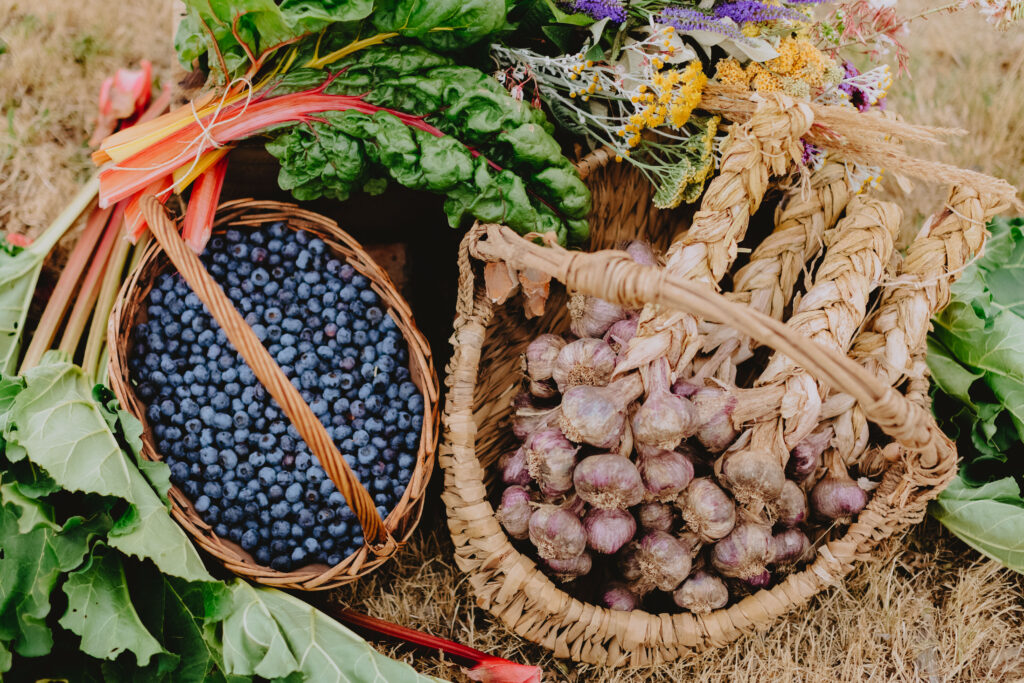Forest Hill Farm is a 5-acre regenerative berry and garlic farm situated in a renowned potato-growing region near Ballarat in Victoria’s Central Highlands. My wife Rachel and I (Ben) live on the farm with our children Vivian (6) and Beau (11). I run the farm day-to-day, while Rachel works off-farm at a local Buddhist primary school in Daylesford.
When we purchased the block in late 2016, we were told it was one of the first irrigated potato paddocks in the district, first irrigated in the early 1950s. The land had been used fairly hard over the preceding 60-odd years and was by that point totally devoid of any vegetation other than ryegrass pasture. The red Ferrosol soil around Newlyn is prized for its structure and fertility, and coupled with the fact that the block had access to irrigation water and was close to plenty of local farmers markets, I was confident we’d found the right spot.
Fast forward nine years and I still pinch myself sometimes when I see how much the place—and our lives—have been transformed. Back then, we were both working full-time as university academics, but despite the lack of all mod cons, we decided to move onto the land in an old $1,500 caravan we’d purchased. After work and on weekends, I used YouTube (plus the occasional local tradie!) to owner-build us a house. At the same time, we began bringing more life back to the land. We planted hundreds of blackwood trees and endemic flowering shrubs in a double-row windbreak around the property. Once the house was finished in 2018, Rachel planted thousands of native grasses, perennial flowers, and shrubs to create a beautiful garden in the centre of the block. By 2019, we were ready to start planting crops in the space between the outer windbreak and the central house garden.
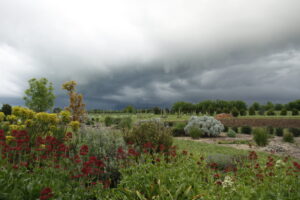
Our first major crop was blueberries. I’d had some experience with them on a friend’s organic farm in Tasmania, and I knew the cold climate and free-draining, acidic soil around Newlyn would suit them well. Blueberries also made sense because they’re a long-lived perennial that can produce for decades, though they need 3–5 years to reach commercial production. My dad gifted me a 1949 model grey Fergie tractor and, using that plus a couple of implements I bought online, I prepared the ground, built netting infrastructure, and planted 700 Northern Highbush blueberry plants.
Next came garlic. While blueberries and garlic might sound like an odd pairing (and I’ve never eaten them together!), they complement each other well for my style of farming. Both are high-value crops in local markets—essential for making a living on such a small property—and garlic’s planting, growing, and harvesting all take place outside the main blueberry picking season. Selling garlic also overlaps neatly with blueberry sales, giving me two products without doubling up all the work at once.
Even with that careful planning, it quickly became clear that 700 blueberry bushes plus market gardening was more than I could manage on my own. This led to my next construction project: a multi-use shed incorporating a commercial kitchen and accommodation for WWOOFers. Rachel and I had both WWOOFed when we were younger and enjoyed it, so it felt natural to make it part of our farming life.
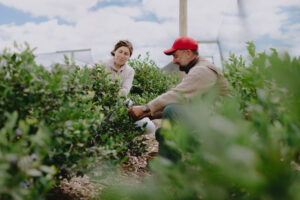
We didn’t accept our first WWOOFer until I’d left my academic job and begun farming full-time. It was just after pandemic restrictions eased, and at first there were few enquiries. I was beginning to wonder if anyone would arrive to help with the blueberry harvest—then, right on cue, a lovely Japanese man named Ken got in touch. He had quite a bit of farming experience and planned to stay for two weeks; he ended up staying for six. It was such a positive experience—especially for our children, who bonded with him—that we didn’t want his stay to end. He camped with us, taught us origami, shared stories of Japanese tea farms, and brought many other cultural exchanges, all while being a great help on the farm. After leaving, he wrote us a lovely review on the WWOOF website. Not long after, we received another enquiry, and since then we’ve hosted 15 WWOOFers and received fifteen 5-star reviews in the last 15 months.
We value WWOOFers not just for their contribution to the farm business, but also for the fun and diversity they bring to our family life. We seek feedback from them about what they enjoyed and what could be improved, so we can keep making their experience better. We’ve learned that, in addition to treating them well and with respect, three things stand out: being clear about work expectations (start and finish times that align with WWOOF guidelines), providing comfortable accommodation, and letting them choose their own food when we shop together.
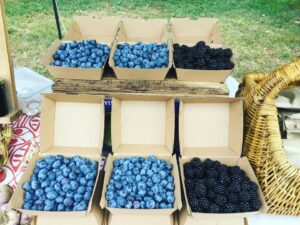
While cultural exchange is a big part of why we host WWOOFers, I also appreciate their practical contribution to the farm. Having an extra set of hands during blueberry and strawberry harvests frees me up to make value-added products like jams and chutneys, which help differentiate my offerings and allow me to keep trading through winter when fresh fruit isn’t available. That ability to diversify and serve the local community year-round is one reason I recently received two agricultural excellence awards from the Ballarat Agricultural Society—an achievement I doubt would have been possible without WWOOFers.
Building our home and farm together over the last nine years has been a fantastic journey. Whenever we return from being away, we feel a surge of joy and appreciation for where we live and what we’ve created. Just as planting native vegetation has brought new life to our land, WWOOFing has brought new life and opportunity to our family and business.
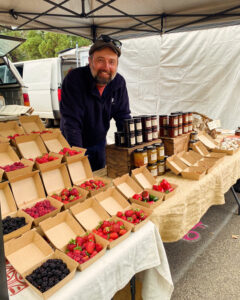
REVIEWS:
Marika
09.08.2025
I stayed at this wonderful farm for about two weeks! Even though it was winter and there wasn’t much work to do, they kindly accepted my request to stay — thank you so much for that. From the moment I saw their photos, I had a feeling this family would be truly lovely people, and I was right! Since there were no other WWOOFers during my stay, I helped for about five hours a day and spent the rest of the time freely, reflecting on my travels so far. It was such a meaningful time for me. Whenever I had any difficulties, Ben would solve everything immediately, Vivi always greeted me with her sweet smile, and Rachel was so caring and thoughtful. I really enjoyed our conversations, and above all, Ben’s farm is an award-winning, incredible place — there’s so much to learn here! I’m so glad my first time in Melbourne and Ballarat was here. And of course, I can’t forget Luna — Luna, careful not to eat too many rabbits! I’d be happy to visit again someday. (I want to try the blueberries — maybe in summer next time!)

